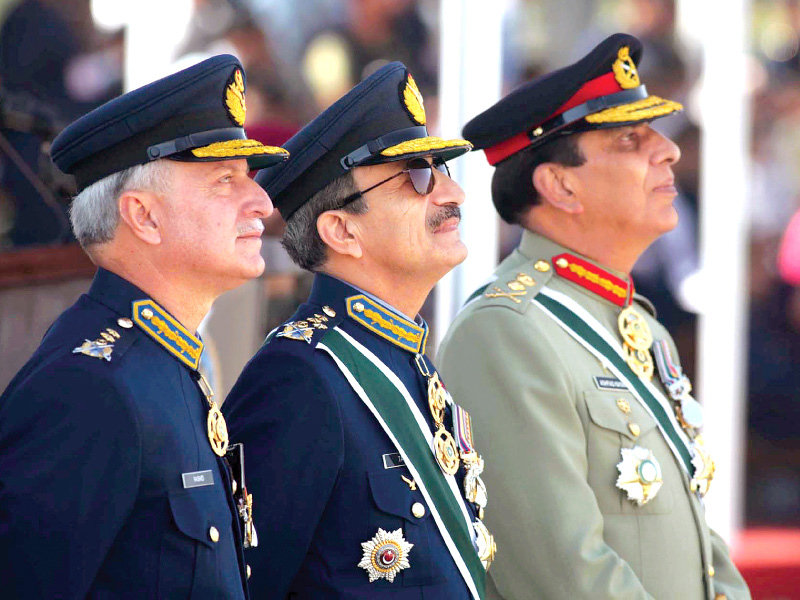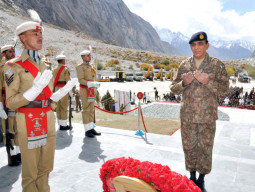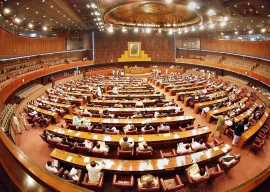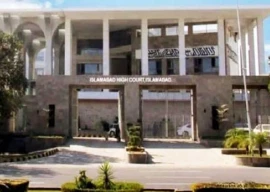
The expected move comes at a time when violence is on the rise in Pakistan, tension boils with arch rival India over disputed Kashmir and as Prime Minister Nawaz Sharif seeks to shore up a stable government just months into his job.
And for the United States, it would mean continuity in Pakistan's approach ahead of a pullout of most foreign troops in neighboring Afghanistan at the end of 2014.
There has been speculation over who will take over as chief of the army, which has ruled the nuclear-armed South Asian nation for more than half of its history since independence in 1947, when Kayani steps down.
Sources and aides close to Kayani said Sharif wanted to make him head of a revamped and more powerful Joint Chiefs of Staff Committee (JCSC). One senior intelligence official said Sharif planned to overhaul the JCSC, a largely ceremonial office, into a "central defense body" by restoring its command over the entire military establishment and giving it additional powers.
"The new JCSC chief will be in charge of the nuclear arsenal. He'll decide on action against terrorists," said the source, adding that new powers included the right to promote, post and transfer key military officers.
"Basically, the JCSC office will be what it was always supposed to be. The overall boss."
Sharif has a history of bitter relations with the army but is keen to preserve a semblance of continuity at a time when Pakistan is struggling to contain a growing Taliban insurgency.
But keeping Kayani in a powerful role would entrench the army once again as the real decision maker in Pakistan, with the civilian government playing second fiddle.
Military officials did not return repeated calls seeking comment. The government's spokesman said he also could not comment until an official announcement on Monday when the current JCSC chief is due to step down.
"THE DEVIL THEY KNOW"
Kayani's post had already been extended for three years in 2010 - to the discontent of some climbing the ranks below him. Sources close to Sharif said he was unlikely to give him another extension, which would allow movement in the top ranks.
"The JCSC chairmanship is the most likely option for Kayani," said a close Sharif aide. "He's an expert on the Pakistani insurgency. He understands the war in Afghanistan."
Under Kayani's command, the army has launched several offensives against al Qaeda and Taliban-linked militants in the tribal regions on the Afghan border. In response, militants have extended their attacks to major cities across Pakistan.
Pakistan is trying to bury the legacy of military rule and this year, for the first time, a civilian government completed its full term and stood aside for Sharif's team to be elected.
Sharif has a difficult relationship with the army, and picking Kayani's successor will be a defining moment of his second term. Kayani was once intelligence chief to Pervez Musharraf, the army chief who overthrew Sharif in 1999.
Lieutenant General Rashad Mahmood, chief of general staff, has emerged as a possible successor and a Kayani favorite.
Other possible candidates include General Tariq Khan, considered pragmatic on US relations, and Lieutenant General Haroon Aslam, the most senior official after Kayani.
"Nawaz wouldn't want an overly strong army chief and if Kayani plans to stick around in uniform, then he would prefer someone close to him," a senior retired army officer said. "Rashad is the man."
Either way, Kayani is widely expected to stay on in one form or another. "He won't simply retire and disappear quietly," one Western diplomat in Islamabad said.
The relationship with the Americans is also key.
The United States has a long-standing alliance with Pakistan, but ties have been strained by concerns that Islamabad is supporting militants fighting US troops in Afghanistan and over U.S. drone strikes on militant targets inside Pakistan.
Fears for Pakistani sovereignty peaked in May 2011 when Osama bin Laden was found and killed in a town not far from Islamabad in a secretive operation by US Navy SEALS.
"Kayani has a good rapport with the Americans and has worked closely with them in Afghanistan," the prime minister's aide said. "For Sharif and the US, it's better the devil they know."
COMMENTS (56)
Comments are moderated and generally will be posted if they are on-topic and not abusive.
For more information, please see our Comments FAQ











































General k simply may go and allow required space for other Generals to be chief. If not he may continue.
Nawaz seth, dont shot foot self!
We need someone like Musharraf!
Read some where once and suffice to add : Grave yards are full of people who considered themselves or who were considered as 'INDISPENSIBLE' !
Not a good decision once again Mr Nawaz Sharif is making vis-a-vis the Military. Lt Gen Rashad a very average but well connected General should not be made COAS. Lt Gen Tariq or Haroon Aslam should have been chosen, as they proved their mettle in the battlefield. Lt Gen Rashad only proved his mettle by making the right connections in the Military and Political circles. Not very professional.
Strongly disapprove.
The proverb is, "No man is indispensable." This is a part of the natural evolution of life. Salams
Clear proof that Pakistan is controlled by CIA operatives.This is not decision of Sharif but those who planted him again to extract all benefit from our soil in their favor.So disgusting that our status in the world is mercenaries or pawns and Kiayni is just being placed here to bully us in favor of his real master.
@Zara:
...and to agree with the Nawaz Sharif for the detention of Pervez Musharraf.
@hamza khan: yes... we need enlightened, liberal, left wing thinking that only Nawaz is capable of... You know, that Nawaz who came in through Zia, and tried to declare himself Ameer-ul-Momineen..... That liberal left wing one, unlike that rightwinger Imran Khan....
I believe this is where we get our priorities wrong. We should strive to respect and preserve the core values of all institutions including the Pakistan Army NOT the individuals. Whether its our CJ Iftikhar Chaudhry, Nawaz Sharif or Kayani. If we stick around with Kayani, we are faltering by putting our faith in an individual and not an institution which ultimately damages its integrity. I am certain the Pakistan Army has plenty of generals such as Gen. Tariq Khan who are competent enough to run a professional army.
As far as delegating powers to Chairman-Joint Chiefs, its a positive step and a promoted 3-star not Kayani should be made the new Chairman with elevated powers to restore some motivation in Army leadership.
The chief of the Army will remain THE CHIEF. Nawaz need to learn this.
Kayani may be retained as CJCSC after retirement? Didn't Reuters even bother to check basic facts before printing such a sweeping article? Kayani retires on Nov 28 and CJCSC retires tomorrow, on Oct 6, which means his replacement would be announced shortly, for a three-year term. How does this create even a fractional possibility for Kayani to become CJCSC after retirement? What a table story!!!!! Grow up Reuters!!!!!!!
he will become president after manmoon.
deal is deal my boy!
@ali:
typical PTI/JI right wing nonsense. try being COAS for a day. you'll be in a hospital within a week.
Kiyani has shown how to play by the rules and still get your way behind closed doors. He is being rewarded.
"And for the United States, it would mean continuity in Pakistan’s approach"
“Kayani has a good rapport with the Americans and has worked closely with them in Afghanistan,” the prime minister’s aide said.
So now you know's interests he really serves! Well done everyone on ensuring we have a PM willing to accommodate this...
it seems we have no competent person in army to become Joint Chiefs of Staff Committee (JCSC)..why not Adnan Rashid the mastermind in D.I.Khan break? we will have peace deal wit TTP very soon
Please let Keyani go. We want someone with a strong character to lead our forces not a go-with-the-flow person.
@Jibran:
that was just too funny what you just said ... hahahahhahaha
"Nawaz’s desire to experiment with the national institutions never goes away"
@ali:
I suppose your definition of "loyal" and mine are different. For the record - Kayani is suspected of harboring OBL (through incompetence or collusion). refused the USA's request to attack the Haqqani, cut off the NATO supply line, and has never punished his troops for numerous cross border firings at NATO troops. Combine that with a record of abuse of CSF and my guess is that Kayani is viewed quite negatively by the USA. As far as blaming him for not attacking the drones - that's more self preservation than loyalty to the USA. Its' unlikely that any high level military commander wants to start a shooting war with the USA - especially over drones.
This write-up is nothing but a cunningly plagiarized and re-phrased version of Saleh Zafir's story published in daily Jang on Thursday. Shame on copycats!!!!!!!
A very strange decision to put a retired General over the serving Chiefs of respective services as the same would be most embarrassing for the latter in the performance of their duties. This arrangement would also dilute the accountability of each one of them and failures in performance of duties can easily be passed on to each other. If Gen Kayani was so indispensable, he could have been given another extension or given foreign affairs portfolio rather than making this complicated and unworkable arrangement.
@Pmahmud: I assume you voted for JUD supported PML_N.......We are seeing results after election
@V. C. Bhutani: there is no point in bombing known terrorists camps. Its not like they are air conditioned buildings housing server farms or huge power plants that can be destroyed. They are open empty fields which are used for training people and when need arises discarded. Show moves on to the next available open space. So bombing open fields with almost non existent infrastructure makes no sense. This problem of terrorists camps can not be solved until Pakistan army decides to abandon the policy.
So drone strikes on Pakistan will continue alongwith NATO supply until India goes 1971 on us from Afghania?
@V. C. Bhutani: So Iassume you are voting for RSS candidate Modi for PM. Then you can have more war and fun.
So now the authority of civilians have reached a point where they cannot even retire a General. So nothing has improved last 5 years. Civilian authority remains a myth created by zardari to bluff us.
ET, why you use Reuters as a source for domestic news? What your local sources say and confirm? Indians seem to be unhappy about Kiyani staying around govt circles. Who is their candidate? Kiyani has lot of experience and knowledge of some very difficult situations and any admin should keep him around for his advice. In any case, we should know it soon.
Why not replace him with Rehman Malik - both seem to make speeches and avoid actually confronting the terrorist - and Malik makes you laugh.
What's the point of being constitutionally elected PM if Nawaz is going to hand over his responsibilities to a retired army officer. Step up and do your job, Nawaz. This also reflects poorly on the state of the military high command that no one is perceived to be capable enough to step into the top job. Our chain of command and system of government should not be tampered with for the convenience of the US or any other country. The US is used to changes of government in the countries it deals with.
Before:
" it was only a week before the coup d’état took place that Nawaz Sharif himself had extended General Musharraf’s term as Chief of Staff until 6 October 2001. "
Present:
"Nawaz wants to make Kayani head of a revamped and more powerful Joint Chiefs of Staff Committee,"
Some people really do not learn from the past to keep their future safe.
Better take the advice of Ret. Gen. Hamid gul in this regard .
Look if PIA,Steel Mill etc are being partially privatised so what is the harm if Nawaz Sharif thinks of buying 26 % shares of the Army too? Just remember that unprecedented casualties the Army suffered during 6 years and these were not in the battlefield. The state of an institution could be judged only when the incumbent leaves. Nawaz never learns.
Another reaffirmation of the fact that Nawaz Shrieff is a mere puppet. The real power is where it always has been in pakistan; the Army!
Army will keep going through the usual blunders and poor nawaz will be held responsible.
@aqib: “expert on Pakistani insurgency”-has that been of any use in last 6 years of the tenure?
Yes ! He has been so, in evading the issue and turning blind eye to the problems facing the Nation ! Just the sort of chap to have in JCSC, after all not much work is required and plenty of time for Golf too !
NS is buying an insurance policy. Kayani had been least intrusive and least interfering in the matters of the civilian government. NS is not sure how his successor would be. So, he is keeping Kayani as an insurance policy.
He is being rewarded for being "blind,mute and deaf person"
"expert on Pakistani insurgency"-has that been of any use in last 6 years of the tenure?
Another Musharraf in the making.
God help us, how can you appoint a man as the head of an institution that has no respect for him anymore!
Hasn't Kiyani been the worst in terms of intelligence disasters .
Let him retire and become a full time golfer.
For God Sake give other people a chance.No body is indisppensible.General kiyani has nothing to his credit except being a blind,mute and deaf person.
tension boils with arch rival India over disputed Kashmir . . . nuclear-armed South Asian nation . . . The new JCSC chief will be in charge of the nuclear arsenal. He’ll decide on action against terrorists . . . growing Taliban insurgency . . . concerns that Islamabad is supporting militants fighting US troops in Afghanistan and over U.S. drone strikes on militant targets inside Pakistan . . . The foregoing are quotations from the report. It is only Pakistan that made itself a rival or adversary to India. India did not think in these terms. What is so great about being nuclear-armed? No one ever accused India of starting any of the wars against Pakistan. Pakistan started all the wars and lost all of them. Are nuclear weapons really a source of comfort and security for Pakistan? Being in charge of the nuclear arsenal means no change from the present position but why is the civilian government shying away from its responsibility for action against terrorists? This is primarily the civilian government’s job. Pakistan’s support to Afghan Taliban in killing US and other personnel of ISAF is the cause of drone strikes. Now, if Pakistan does not or cannot rein in its own terrorists, shouldn’t USA act to protect its and Allied personnel? If Pakistan was so touchy about violation of its sovereignty and territorial integrity, it should have shown some concern for the sovereignty and territorial integrity of its neighbours. If I had the power to decide Indian policy, I would order first thing tomorrow morning Indian air strikes on all terrorist training camps in Pakistan and POK, without moving a single Indian soldier across the IB/LoC. But I am a mere Indian citizen. V. C. Bhutani, Delhi, 4 Oct 2013, 1833 IST
Potentially the biggest mistake Nawaz Sharif could ever make; Kayani has not only prevented the best and brighest officers from rising to the top but has tarnished the office of the Chief by getting himself and his family involved in shady financial dealings. The Army needs a new Chief, someone who is respected throughout the army and not just only by the top brass.
some people never learn
Worst move by Sharif, of course his masters in Washington dont want Kiyani to go as he is a loyal to Uncle Sam. Under Kiyani, Pakistan has suffered humiliation after humiliation. from drones to sallala to may 2nd raid. Kiyani is worst Army chief since yayha khan. if he was that good, TTP would have been history and Baluchistan would have been peaceful. We need new blood and new thinking. We need disassociation from USA and make new friends and allies. But since our political leadership is bankrupt, the puppet show will continue.
I am always of the opinion that high ranking personnel whether from military, or civilian government should be retained in the military or civil administration, keeping in view of their long and outstanding performance, their experience, knowledge, skills and above all their vision.
It will be good for the country that General Kiyani should be retained at one of the top slots of Pakistan Army, as he is an asset for Pakistan and have played a key role in promoting democracy in the country.
Why anyone else should get the blame. Kayyani should be given extension till our total demise.
Nawaz's desire to experiment with the national institutions never goes away.
So all those memes back in 2008 with the headline "Kayani retires 2019" are coming true.